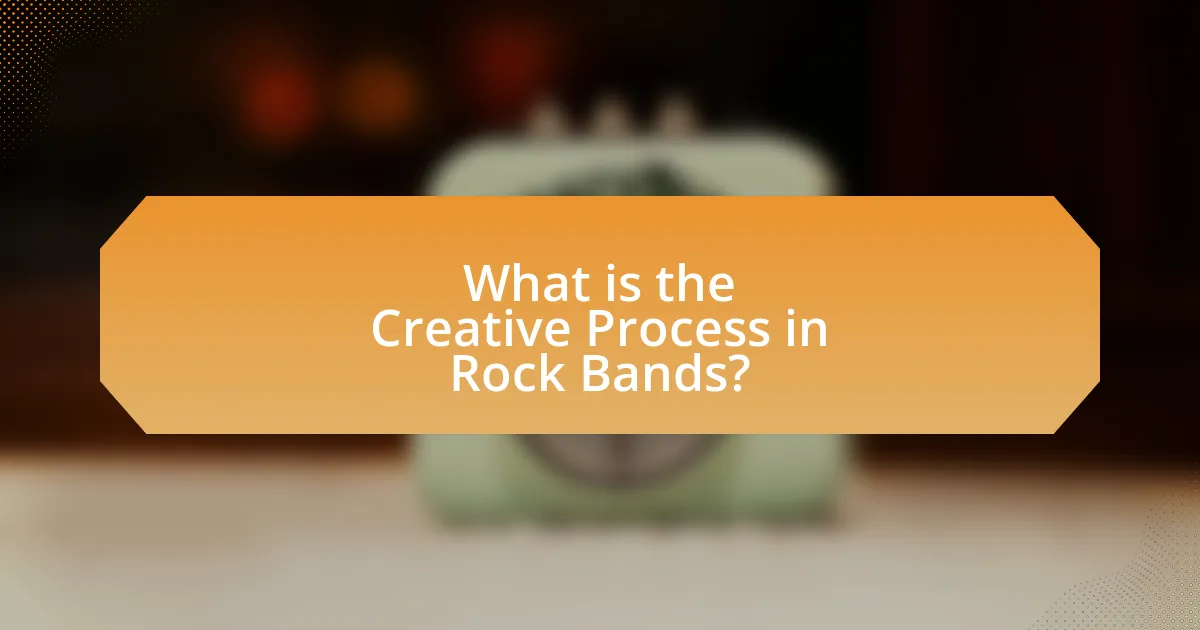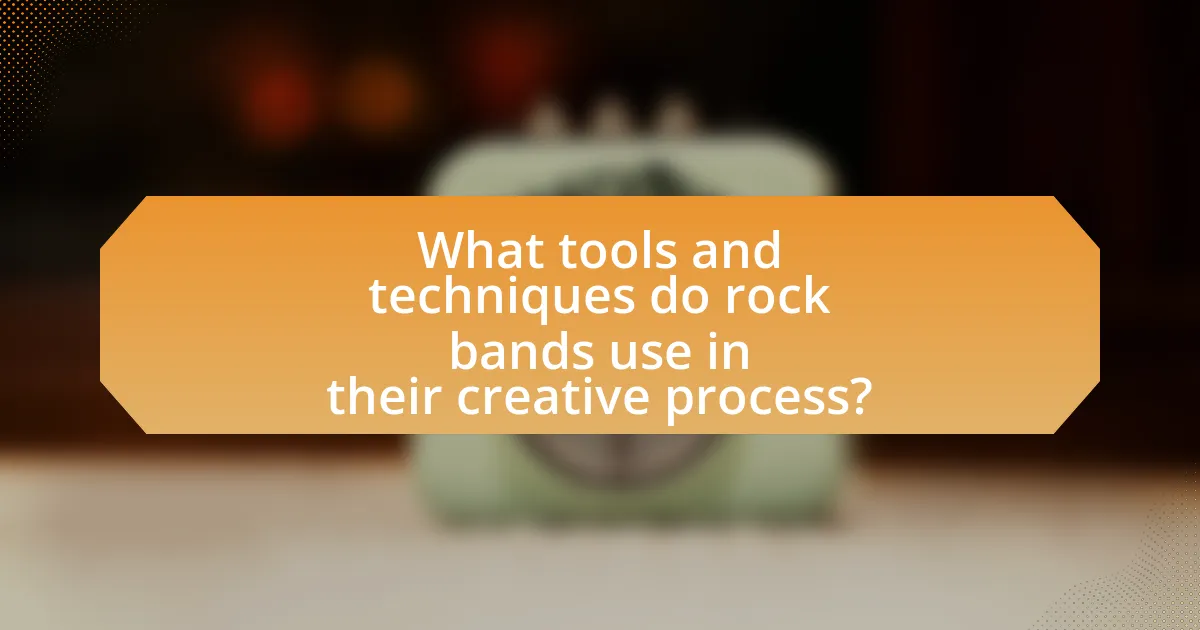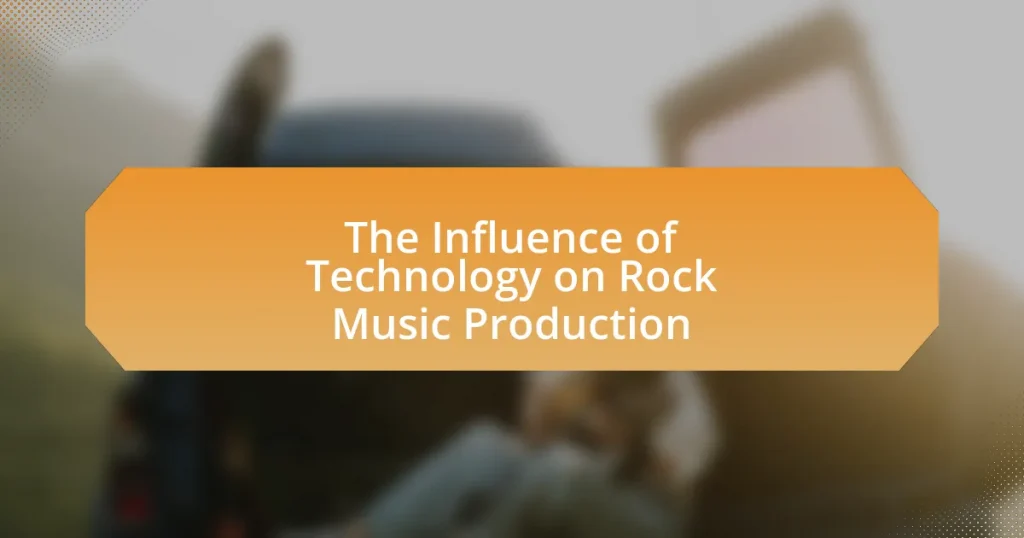The article explores the creative process of rock bands, detailing how collaboration among members leads to the generation of musical ideas, composition, and refinement of lyrics. It highlights the initial steps in songwriting, the influence of band dynamics, and the importance of creativity for a band’s success and identity. Additionally, the article discusses the tools and techniques used in songwriting, common challenges faced, and strategies to maintain creativity under pressure. Key stages of songwriting, including idea generation and arrangement, are also examined, providing insights into how rock bands craft their iconic hits.

What is the Creative Process in Rock Bands?
The creative process in rock bands typically involves collaboration among band members to generate ideas, compose music, and refine lyrics. This process often begins with one member presenting a musical idea, which is then developed collectively through jamming sessions, discussions, and experimentation. For instance, bands like The Beatles and Led Zeppelin have been known to engage in extensive collaborative writing, where each member contributes their unique skills and perspectives, leading to innovative compositions. Research indicates that such collaborative environments can enhance creativity and lead to more successful musical outcomes, as seen in the diverse styles and iconic hits produced by these bands.
How do rock bands typically approach songwriting?
Rock bands typically approach songwriting through collaboration among band members, often blending individual ideas into a cohesive piece. This collaborative process can involve brainstorming sessions, jamming together to create melodies, and refining lyrics that resonate with their collective vision. For instance, bands like The Beatles and Led Zeppelin are known for their collaborative songwriting, where each member contributed distinct elements that shaped their iconic sound. This method not only fosters creativity but also allows for diverse influences to be integrated, resulting in songs that reflect the band’s unique identity.
What are the initial steps in the songwriting process?
The initial steps in the songwriting process typically involve brainstorming ideas and establishing a theme. Songwriters often start by generating concepts, emotions, or stories they want to convey, which can be inspired by personal experiences, observations, or current events. Following this, they may create a rough structure for the song, outlining sections such as verses, choruses, and bridges. This foundational work sets the stage for developing melodies and lyrics, ensuring that the song has a coherent direction.
How do band dynamics influence the creative process?
Band dynamics significantly influence the creative process by shaping collaboration, communication, and conflict resolution among members. Effective collaboration often leads to a more diverse range of ideas, as different perspectives can enhance creativity. For instance, bands like The Beatles thrived on their ability to blend individual strengths, resulting in innovative songwriting and arrangements. Conversely, poor dynamics can stifle creativity, as seen in bands that experience internal conflicts, which can lead to a breakdown in communication and hinder the flow of ideas. Research indicates that groups with positive dynamics are more likely to produce successful creative outcomes, as they foster an environment where members feel valued and motivated to contribute.
Why is the creative process important for rock bands?
The creative process is crucial for rock bands because it enables them to produce original music that resonates with their audience. This process fosters collaboration among band members, allowing diverse ideas and influences to merge, which can lead to innovative sound and lyrical content. Historical examples, such as The Beatles’ songwriting partnership, illustrate how collaboration can yield timeless hits, demonstrating that the creative process is essential for artistic growth and commercial success in the music industry.
What role does creativity play in a band’s success?
Creativity is essential for a band’s success as it drives innovation in songwriting, performance, and overall artistic expression. Bands that consistently produce original and engaging music are more likely to capture the attention of audiences and industry professionals. For instance, a study published in the Journal of Popular Music Studies found that bands with unique musical styles and creative approaches to songwriting tend to achieve higher commercial success and critical acclaim. This correlation highlights how creativity not only differentiates a band in a competitive market but also fosters a deeper connection with fans, ultimately contributing to sustained success.
How can the creative process impact a band’s identity?
The creative process significantly shapes a band’s identity by influencing their musical style, lyrical themes, and overall image. For instance, a band that prioritizes collaborative songwriting may develop a more diverse sound, reflecting the individual influences of each member, which can lead to a unique identity that resonates with a broader audience. Additionally, the creative choices made during the songwriting process, such as the incorporation of personal experiences or social commentary, can establish a band’s thematic identity, making their music relatable and distinctive. Historical examples include bands like The Beatles, whose innovative approaches to songwriting and experimentation with various genres helped define their identity and set them apart in the music industry.

What are the key stages of songwriting for rock bands?
The key stages of songwriting for rock bands include idea generation, composition, arrangement, and refinement. In the idea generation stage, band members brainstorm themes, concepts, or emotions to explore in their song. During composition, they create melodies, harmonies, and lyrics, often collaborating to develop the song’s structure. The arrangement stage involves organizing the song’s sections, such as verses, choruses, and bridges, to enhance flow and dynamics. Finally, in the refinement stage, the band revises and polishes the song, focusing on details like instrumentation, vocal delivery, and production elements to achieve a cohesive sound. These stages are essential for crafting impactful rock music that resonates with audiences.
How do rock bands generate ideas for their songs?
Rock bands generate ideas for their songs through various methods, including personal experiences, collaboration, and experimentation with musical elements. Personal experiences often serve as a rich source of inspiration, allowing band members to draw from their own lives, emotions, and relationships. Collaboration among band members fosters creativity, as different perspectives and ideas can lead to unique song concepts. Additionally, experimentation with musical elements, such as chord progressions, melodies, and rhythms, can spark new ideas and directions for songwriting. This multifaceted approach is supported by the fact that many successful rock songs are rooted in authentic storytelling and innovative musical exploration.
What techniques do bands use for brainstorming song concepts?
Bands use various techniques for brainstorming song concepts, including collaborative writing sessions, free association, and thematic exploration. Collaborative writing sessions involve band members coming together to share ideas and build off each other’s contributions, fostering creativity through interaction. Free association allows members to express spontaneous thoughts and feelings, often leading to unexpected lyrical or melodic ideas. Thematic exploration focuses on specific subjects or emotions, guiding the songwriting process and ensuring coherence in the final piece. These methods are supported by the fact that many successful bands, such as The Beatles and Fleetwood Mac, have utilized similar approaches to generate innovative and memorable songs.
How do personal experiences influence song ideas?
Personal experiences significantly influence song ideas by providing authentic emotions and relatable narratives that resonate with listeners. For instance, many songwriters draw from their own life events, such as relationships, struggles, and triumphs, to create lyrics that convey genuine feelings. Research indicates that autobiographical elements in songwriting can enhance emotional connection; a study published in the Journal of Music Therapy found that songs reflecting personal experiences often lead to greater listener engagement and empathy. This connection is evident in numerous rock hits, where artists like Bruce Springsteen and Taylor Swift have crafted songs based on their life stories, illustrating how personal experiences serve as a rich source of inspiration for songwriting.
What is the role of collaboration in the songwriting process?
Collaboration plays a crucial role in the songwriting process by combining diverse perspectives and skills, which enhances creativity and innovation. When multiple songwriters work together, they can share ideas, refine lyrics, and develop melodies that might not emerge in solitary writing. Research indicates that collaborative songwriting often leads to more commercially successful songs; for instance, a study by the University of Southern California found that songs co-written by multiple authors tend to achieve higher chart rankings compared to solo-written songs. This synergy allows for a richer exploration of themes and musical styles, ultimately resulting in a more dynamic and appealing final product.
How do band members contribute to the songwriting process?
Band members contribute to the songwriting process by bringing diverse musical ideas, lyrical themes, and individual skills to the collaboration. Each member often contributes unique melodies, harmonies, or instrumental arrangements, which can shape the overall sound of a song. For example, in bands like The Beatles, John Lennon and Paul McCartney frequently co-wrote songs, blending their distinct styles and perspectives, resulting in innovative compositions that defined their music. This collaborative approach allows for a richer creative output, as different influences and experiences are integrated into the songwriting process.
What are the benefits of co-writing songs with other musicians?
Co-writing songs with other musicians enhances creativity and broadens the songwriting process. Collaborating allows artists to combine diverse perspectives, leading to innovative ideas and unique sounds. For instance, a study by the University of Southern California found that collaboration can increase the quality of creative output by leveraging the strengths of each songwriter. Additionally, co-writing fosters networking opportunities, which can lead to increased exposure and potential commercial success. This collaborative approach not only enriches the songwriting experience but also often results in more polished and marketable music.

What tools and techniques do rock bands use in their creative process?
Rock bands utilize a variety of tools and techniques in their creative process, including songwriting software, digital audio workstations (DAWs), and collaborative jam sessions. Songwriting software like Ableton Live and Logic Pro enables musicians to compose, arrange, and edit their music efficiently. DAWs facilitate recording and mixing, allowing bands to experiment with different sounds and arrangements. Collaborative jam sessions foster creativity by encouraging spontaneous musical ideas and interactions among band members, which can lead to unique compositions. These methods are supported by the fact that many successful rock albums have been produced using these technologies, demonstrating their effectiveness in the creative process.
How do technology and software aid in songwriting?
Technology and software significantly aid in songwriting by providing tools that enhance creativity, streamline collaboration, and facilitate the production process. Digital audio workstations (DAWs) like Ableton Live and Logic Pro allow songwriters to compose, edit, and arrange music efficiently, enabling quick experimentation with different sounds and structures. Additionally, software like MIDI sequencers and virtual instruments expands the sonic palette available to songwriters, allowing them to create complex arrangements without needing extensive studio resources. Collaborative platforms such as Splice and Soundtrap enable musicians to work together remotely, sharing ideas and tracks in real-time, which fosters innovation and diverse input. These advancements in technology and software have transformed the songwriting landscape, making it more accessible and collaborative than ever before.
What are popular tools used by rock bands for songwriting?
Popular tools used by rock bands for songwriting include digital audio workstations (DAWs) like Ableton Live, Pro Tools, and Logic Pro. These software applications allow musicians to compose, record, and edit music efficiently. Additionally, many bands utilize songwriting apps such as Songwriter’s Pad and Evernote for lyric writing and idea organization. The use of these tools is supported by the fact that DAWs have become industry standards, with over 50% of professional musicians reporting their reliance on them for music production.
How does recording technology influence the creative process?
Recording technology significantly influences the creative process by enabling musicians to experiment with sound and structure in ways that were previously impossible. This technology allows for multi-track recording, which facilitates layering of instruments and vocals, leading to more complex arrangements. For instance, the use of digital audio workstations (DAWs) has democratized music production, allowing artists to manipulate audio with precision and creativity. Historical examples include the Beatles’ innovative use of studio techniques in albums like “Sgt. Pepper’s Lonely Hearts Club Band,” where recording technology was pivotal in shaping their sound. Thus, recording technology not only enhances the creative possibilities for artists but also transforms the overall approach to music composition and production.
What are common challenges faced during the creative process?
Common challenges faced during the creative process include writer’s block, lack of inspiration, and difficulties in collaboration. Writer’s block can hinder progress, as musicians may struggle to generate new ideas or lyrics. Lack of inspiration often leads to stagnation, where artists feel disconnected from their creative flow. Additionally, collaboration challenges arise when band members have differing visions or conflicts, which can disrupt the creative synergy necessary for producing music. These challenges are frequently documented in interviews with musicians and studies on creativity, highlighting their impact on the songwriting process.
How do bands overcome writer’s block?
Bands overcome writer’s block by employing various strategies such as collaboration, changing their environment, and utilizing creative exercises. Collaboration allows band members to share ideas and inspire each other, which can lead to breakthroughs in songwriting. Changing the environment, such as working in a different location or taking a break from routine, can stimulate creativity and provide new perspectives. Additionally, engaging in creative exercises, like free writing or improvisation, can help to unlock new ideas and overcome mental barriers. These methods are supported by the experiences of numerous successful bands who have publicly shared their techniques for maintaining creativity during challenging times.
What strategies help maintain creativity under pressure?
To maintain creativity under pressure, rock bands often employ strategies such as setting clear goals, utilizing structured brainstorming sessions, and fostering a supportive environment. Setting clear goals helps focus the creative process, allowing band members to channel their energy effectively. Structured brainstorming sessions encourage the free flow of ideas while providing a framework that can lead to innovative solutions. Additionally, fostering a supportive environment, where members feel safe to express their thoughts without judgment, enhances collaboration and creativity. Research indicates that a positive group dynamic can significantly boost creative output, as seen in studies on team collaboration in creative industries.
What best practices can enhance the creative process for rock bands?
To enhance the creative process for rock bands, implementing structured songwriting sessions is essential. These sessions encourage collaboration and focus, allowing band members to share ideas and build upon each other’s contributions. Research indicates that bands like The Beatles and Radiohead have utilized dedicated time for songwriting, resulting in iconic albums. Additionally, incorporating diverse influences, such as different musical genres or cultural elements, can stimulate creativity and lead to innovative soundscapes. For instance, the fusion of rock with electronic music has produced successful tracks for bands like Linkin Park. Regularly seeking feedback from peers or mentors can also refine ideas and improve the overall quality of the music.
How can bands create an inspiring environment for songwriting?
Bands can create an inspiring environment for songwriting by fostering collaboration and open communication among members. This collaborative atmosphere encourages the sharing of ideas, leading to innovative musical concepts. Research indicates that environments where musicians feel safe to express themselves can significantly enhance creativity, as shown in a study by the University of California, which found that group dynamics positively influence creative output. Additionally, incorporating elements like comfortable spaces, access to instruments, and inspirational decor can stimulate creativity, as these factors contribute to a relaxed and motivating atmosphere conducive to songwriting.
What routines can help foster creativity among band members?
Regular jam sessions can help foster creativity among band members by providing a structured yet flexible environment for spontaneous musical exploration. These sessions encourage collaboration and experimentation, allowing members to share ideas and build upon each other’s contributions. Research indicates that collaborative environments enhance creative output, as seen in studies like “The Role of Collaboration in Creativity” by Amabile et al., which highlights that teamwork can lead to more innovative solutions. Additionally, setting aside time for brainstorming sessions focused on lyrics or themes can stimulate creative thinking, as it allows members to engage in focused discussions that inspire new concepts.



